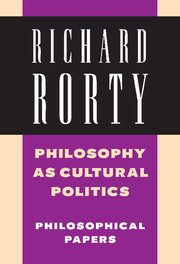Book contents
- Frontmatter
- Contents
- Preface
- Acknowledgments
- I RELIGION AND MORALITY FROM A PRAGMATIST POINT OF VIEW
- II PHILOSOPHY'S PLACE IN CULTURE
- 5 Grandeur, profundity, and finitude
- 6 Philosophy as a transitional genre
- 7 Pragmatism and romanticism
- 8 Analytic and conversational philosophy
- III CURRENT ISSUS WITHIN ANALYTIC PHILOSOPHY
- Index of names
5 - Grandeur, profundity, and finitude
Published online by Cambridge University Press: 05 June 2012
- Frontmatter
- Contents
- Preface
- Acknowledgments
- I RELIGION AND MORALITY FROM A PRAGMATIST POINT OF VIEW
- II PHILOSOPHY'S PLACE IN CULTURE
- 5 Grandeur, profundity, and finitude
- 6 Philosophy as a transitional genre
- 7 Pragmatism and romanticism
- 8 Analytic and conversational philosophy
- III CURRENT ISSUS WITHIN ANALYTIC PHILOSOPHY
- Index of names
Summary
Philosophy occupies an important place in culture only when things seem to be falling apart – when long-held and widely cherished beliefs are threatened. At such periods, intellectuals reinterpret the past in terms of an imagined future. They offer suggestions about what can be preserved and what must be discarded. The ones whose suggestions have been most influential win a place on the list of “great philosophers”. For example, when prayer and priestcraft began to be viewed with suspicion, Plato and Aristotle found ways for us to hold on to the idea that human beings, unlike the beasts that perish, have a special relation to the ruling powers of the universe. When Copernicus and Galileo erased the world-picture that had comforted Aquinas and Dante, Spinoza and Kant taught Europe how to replace love of God with love of Truth, and how to replace obedience to the divine will with moral purity. When the democratic revolutions and industrialization forced us to rethink the nature of the social bond, Marx and Mill stepped forward with some useful suggestions.
In the course of the twentieth century there were no crises that called forth new philosophical ideas. There was no intellectual struggle comparable in scale to the one that Andrew White famously described as the warfare between science and theology. Nor were there any social convulsions that rendered either Mill's or Marx's suggestions irrelevant. As high culture became more thoroughly secularized, the educated classes of Europe and the Americas became complacently materialist in their understanding of how things work.
- Type
- Chapter
- Information
- Philosophy as Cultural PoliticsPhilosophical Papers, pp. 73 - 88Publisher: Cambridge University PressPrint publication year: 2007
- 6
- Cited by



